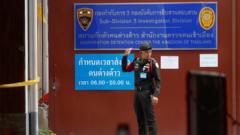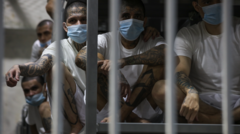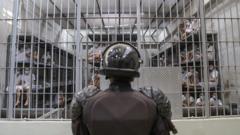**The Thai government's recent deportation of Uyghurs to China, where they face potential persecution, has sparked strong criticism from human rights groups and global leaders.**
**Thailand's Controversial Deportation of Uyghurs Raises Human Rights Concerns**

**Thailand's Controversial Deportation of Uyghurs Raises Human Rights Concerns**
**At least 40 Uyghurs deported back to China despite international warnings**
At least 40 Uyghurs have been deported from Thailand to China, a move described as alarming by human rights advocates, who caution that these individuals could face severe consequences such as torture or even death. After spending a decade in a detention center in Bangkok, the group was reportedly repatriated to China's Xinjiang region on Thursday. This incident marks the first instance of Thailand sending Uyghurs back to China since 2015, amid ongoing allegations from international observers that China has committed genocide against Uyghurs and other predominantly Muslim ethnic groups in Xinjiang.
The deportation, executed in secrecy, has met with considerable backlash, particularly from the United States and the United Nations, who previously expressed concerns regarding the potential treatment these individuals might face upon their return. Reports indicated that several trucks, with windows covered, left Bangkok's main immigration center in the early hours, leading to suspicions about the operation. Following the trucks' departure, an unscheduled China Southern Airlines flight was tracked heading to Xinjiang.
While Thai officials stated that the decision to deport was made because the detainees had already been held for over a decade, critics argue that this decision is a violation of human rights principles. Prime Minister Paetongtarn Shinawatra claimed assurances were given regarding the welfare of the Uyghurs upon their return to China, although no confirmations were made at the time of inquiries from reporters. In contrast, Beijing referred to the group as "Chinese illegal immigrants" and denied their Uyghur identity.
The deported group comprised more than 300 Uyghurs captured at the Thai border in 2014 while seeking refuge from repression in Xinjiang. Following a previous mass deportation in 2015, many were sent to Turkey, worsening the ongoing plight of those left behind in Thailand. Opposition politicians in Thailand expressed outrage, asserting the deportations constitute a breach of human rights. Activists such as Phil Robertson from the Asia Human Rights and Labour Advocates condemned the action as a failure of the Thai government to protect those seeking asylum.
Human Rights Watch responded to the deportations by stating that the group is now at risk of torture and indefinite imprisonment. The organization criticized Thailand for disregarding international obligations, emphasizing that no lawful justification exists for the transfer. Secretary of State Marco Rubio condemned the action, urging governments to refrain from forcibly returning Uyghurs to China, highlighting the ongoing humanitarian crisis in Xinjiang.
The European Union, along with UK Foreign Secretary David Lammy, voiced disapproval of Thailand's decision. With approximately 12 million Uyghurs residing in China’s Xinjiang region, significant concerns have been raised regarding cultural erasure, as the state is accused of diluting the Uyghur population through mass migration and restricting religious practices. Shortly following the deportation, reports surfaced of the Chinese government altering village names in an effort to erase Uyghur cultural identity.



















